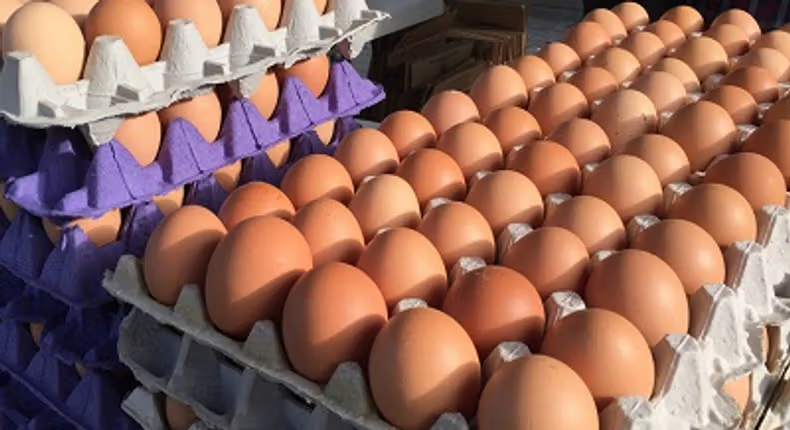The increase in cost of eggs is not commensurate to the rate at which the cost of feed materials is increasing.
The Poultry Association of Nigeria (PAN) has blamed the consistent hike in egg prices on low production and high cost of feed.The PAN Lagos state Chairman, Mojeed Iyiola, and other stakeholders in the sector disclosed this in separate interviews with the News Agency of Nigeria (NAN) on Wednesday in Lagos.
NAN reports that the price of the egg has increased tremendously, making the common source of protein in the past out of the reach of many Nigerians. NAN also reports that a crate of eggs sells between ₦3,800 and ₦4,000 from the farm gate and above ₦4,500 in retail shops and markets against ₦3,200 to ₦3,500 it was sold in May.
A tonne of maize currently sells for ₦800,000 as against ₦400,000 in January. Iyiola attributed the persistent hike in the price of eggs to scarcity.
“The reason for the current hike in the price of eggs is that eggs are very scarce now.
“Most farmers have sold off their old layers, and to get new stock is very expensive as the price of a day-old chick is becoming unbearable.
“Farmers able to buy day-old chicks are considered to be well-to-do. Also, a majority of our local farmers have shut down their farms due to the high cost of feed.
“Presently, a kilogramme of maize costs as high as ₦850 as against ₦400 to ₦500 that was being sold for at the beginning of the year.
“The same thing applies to soya and the groundnut cake, the prices have increased astronomically,” the PAN chairman said.
He, however, said that the increase in the cost of eggs is not commensurate to the rate at which the cost of feed materials is increasing.
“In fact most farmers are running at a loss. That is why the only existing farmers are trying to keep the sector running.
“Even if a crate of egg sells at ₦5,000, the farmers will only be managing to get by.
“We want to liaise with the food hub at Idi-oro, our farmers are complaining that they can no longer afford to sell at a loss.
“We supply eggs at the farm gate at ₦3,800 per crate and with the same logistics, we still sell at ₦3,800 at the hub. This means we are running at a loss.
“With all these incurred logistics expenses a crate of eggs should be sold for ₦4,500 at the food hub,” he stated.
According to him, the way things are going if things are not controlled, the sector may collapse entirely.
“It seems consuming eggs have become luxury in our diets.
“We have scheduled a meeting with the government to tackle the situation because there is nothing an individual can do on this issue. We need government intervention,” Iyiola added.
Also speaking, Godwin Egbebe, the National Publicity Secretary PAN, attributed the hike in the cost of raw materials to the reason for the rise in egg prices.
“Early this month, a tonne of maize sold for ₦720,000 but as of today 12 June 2024, it sells at ₦800,000. During the former President Buhari’s administration a tonne of maize was sold at ₦80,000.
“The increment is over 1,000 per cent, so you can see the reasons for the hike in poultry producers.
“The way forward is that government as a matter of urgency should bring in grains in the short term.
“And in the long term, they should ensure that farmers go back to their farms secured.
“Farmers are not producing enough grains because of insecurity. Palliatives cannot solve the problem, it is like a drop in an ocean. It makes little or no impact,” Egbebe said.
He said that in some supermarkets, eggs are being sold for ₦5,000 and above.
“Everyday we go to buy feeds, the price changes. As we speak, farmers are actually selling at a loss.
“Most farmers are not breaking even, so they are folding up, it is not funny anymore,” he stated.
On her part, Theresa Muyi, a poultry farmer in Alimosho, decried the situation and the helplessness of local farmers to the persistent hike in feed prices.
“Poultry feed has gone up and we now sell a crate of egg from the farm gate between ₦3,800 and ₦4,000. The retailers sell from ₦4,500 and above.
“The price is still unstable because almost every week there is an increase in feed prices.
“Eggs seem to have become luxury to the common man as a piece of egg now sells at ₦200 and above,” Muyi noted.
